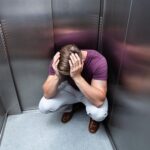Claustrophobia refers to an intense fear of confined or enclosed spaces. When one feels claustrophobic, they feel anxious or uncomfortable at the thought of being in a tightly enclosed space. The very idea of such a thing overwhelms them and keeps them up at night.
Claustrophobia mainly occurs at night if one is suffering from sleep problems (Sawchuk)
Why does one feel Claustrophobic at night?
Many people feel claustrophobic at night while sleeping. Although there is very little research done on this, some suggest that Claustrophobia can occur at night due to basic reasons such as sleep problems or insomnia, fear of the dark, feelings of anxiety, medical concerns, and other major life events.
However, simple steps can be taken to overcome these feelings and lead a better quality of life.
Symptoms of Claustrophobia –
The symptoms of Claustrophobia are similar to those of anxiety or panic attacks. One might experience physical as well as emotional symptoms.
Physical symptoms include:
- Sweating or shaking.
- Tightness or heaviness in the chest or rapid heartbeat.
- Trouble breathing or breathing fast.
- Chills or flushing (red, hot face).
- Choking feeling.
- Upset stomach or feeling “butterflies” in your stomach.
- Dizziness, feeling faint or lightheaded.
- Dry mouth.
- Feeling confused or disoriented.
- Numbness or tingling.
Emotional symptoms include:
- Fear of losing control.
- Not knowing what is happening.
- Fear of fainting.
- Feelings of dread.
- Feeling overwhelming anxiety.
- Feeling an intense need to flee or leave the situation.
- Understanding that the fear isn’t rational, but you still can’t overcome it.
- Fear of dying
How can one deal with Claustrophobia?
Psychotherapy is one of the most common and effective ways of dealing with Claustrophobia. Some kinds of psychotherapy are:
- Exposure Therapy
This type of psychotherapy usually involves being gradually exposed to your feared situation. With gradual and repeated exposure, the idea is that you will eventually feel comfortable in your feared situation. This kind of therapy also includes relaxation and breathing exercises while being exposed to the feared situation.
Exposure therapy commonly involves:
- Facing your feared phobia directly, in real-time.
- Recalling and describing your feared experience.
- Looking at pictures or using virtual reality to get close to the real feared experience yet be in a safe environment.
Exposure therapy can be paced in several ways depending on you and the therapist.
- Cognitive behavioral therapy (CBT)
This type of psychotherapy and talk therapy mainly focuses on managing your phobia by changing the way you think, feel and behave.
CBT commonly includes:
- Discussing your symptoms and describe how you feel.
- Explore your phobia more deeply to gain an understanding of how to respond and manage it.
- Learn how to recognize, re-evaluate and change your thinking.
- Use problem-solving skills to learn how to cope.
- Face your phobia instead of running away from it or avoiding it.
- Learn how to keep your mind and body calm with the help of relaxation techniques.
In addition to therapy, medications are also sometimes prescribed if the therapist feels it is needed to treat anxiety caused by Claustrophobia. For example, your provider might prescribe medications to treat anxiety when you’re flying.
In addition to seeing your healthcare provider or therapist, you can try any of the following that makes you feel comfortable and more at ease:
- Talk to someone you trust: Having someone you trust to talk to about your claustrophobic fears can be helpful to you.
- Learn strategies to relax: Try deep breathing exercises (breathe in slowly and deeply through your nose, hold for three seconds, breathe out slowly through your mouth), meditation, mindfulness, progressive muscle relaxation (tensing and relaxing groups of muscles), and other methods to relax. You can also try to visualize and focus your attention on something that makes you feel calm and peaceful.
- Join a support group: Support groups can be helpful in knowing you are not alone and for sharing tips and advice.
- Check if an organization provides a course for overcoming your fear: For example, if you’re afraid of flying, check if an airline or your local airport offers a class on fear of flying.
- Take care of yourself: Eat a well-balanced diet, follow good sleep habits and exercise for 30 minutes at least five days a week. Healthy lifestyle choices can decrease your anxiety to a large extent.
Sources-
- Panic attack specifier. In: Diagnostic and Statistical Manual of Mental Disorders DSM-5. 5th ed. Arlington, Va.: American Psychiatric Association; 2013. http://dsm.psychiatryonline.org.
- Zak RD, et al. Nightmares and nightmare disorder in adults. https://www.uptodate.com/contents/search.
- Sawchuk CN (expert opinion). Mayo Clinic, Rochester, Minn. https://www.mayoclinic.org/biographies/sawchuk-craig-n-ph-d-l-p/bio-20085911
- American Psychiatric Association. Diagnostic and Statistical Manual of Mental Disorders (DSM-5). Specific Phobia. Washington DC: American Psychiatric Association, 2013. http://repository.poltekkes-kaltim.ac.id/657/1/Diagnostic%20and%20statistical%20manual%20of%20mental%20disorders%20_%20DSM-5%20%28%20PDFDrive.com%20%29.pdf
- https://my.clevelandclinic.org/health/diseases/21746-claustrophobia


